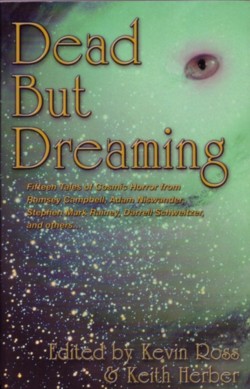Dead But Dreaming
edited by Kevin Ross and Keith Herber
Originally for Raw, New Things #6, 8/1/2002

Quite notably, the stories in this anthology take place in many different locations, and with many different protagonists. There are strange post-apocalypse futures, far-future space opera, stories set during World War II, the twenties, and of course the modern day. Narration comes from a hired assassin, an anthropologist, a scriptwriter, a ten year-old boy, and a want-to-be occultist. In each case, there is at least as much of the writer in the story as there is of Lovecraft, and in many cases this keeps the stories fresh.
What sets "The Disciple" apart from an uninspired story is the direction the story goes. I thought I knew where it was going, but I was quite pleasantly proven wrong. The quality of the prose kept me interested, even when I thought the ending inevitable and cliched.
The most structurally interesting story is Lisa Morton’s "Call of Cthulhu: The Motion Picture". It is an impressive tribute to Lovecraft, structurally imitating ‘The Call of Cthulhu", but not subsuming itself wholly into that tale. And while the main plot line is interesting, the story also presents us with layers and layers of subtext. And the Graduate Student that sleeps within me can’t resist reading between the lines of a story, especially when it cries out to be interpreted. I won’t bore the reader with my musings, but I will advise the prospective purchaser of the book to read the story carefully; there’s a lot going on beneath Lisa Morton’s deceptively simple prose.
Especially good is Ramsey Campbell’s "The Other Names." In general, I haven’t been very impressed with Campbell. Yes, "Cold Print" is an excellent story, but his original Brichester stories are the work of a beginning writer, good but not yet technically proficient. "The Other Names" is a subtle tale by a master of his craft, who knows how to bring us chills. Campbell allows us to figure out what’s going on in the story just a few paragraphs ahead of his protagonist, a very effective device that is difficult to evoke properly. My hat’s off to Mr. Campbell for this story.
David Annandale’s "Final Draft" is in every way the perfect closing of the book. Certainly one of the most insidiously effective of the stories presented, Annandale also shows a visual flare that the other stories seem to lack. If there is a story in this collection that most effectively captures the slowly-revealed cosmic hopelessness of Lovecraft’s best work, I would say that this is it.
Other stories are less successful, but they never fall down to the level of utter dullness. Darrell Schweitzer’s "Why We Do It" is the least interesting story, but at a page and a half, it’s not much to suffer through. These days, I have to call a Lovecraftian collection satisfactory if I like more stories than I dislike. Dead but Dreaming far exceeds this mark, with all but a few of the stories leading somewhere interesting